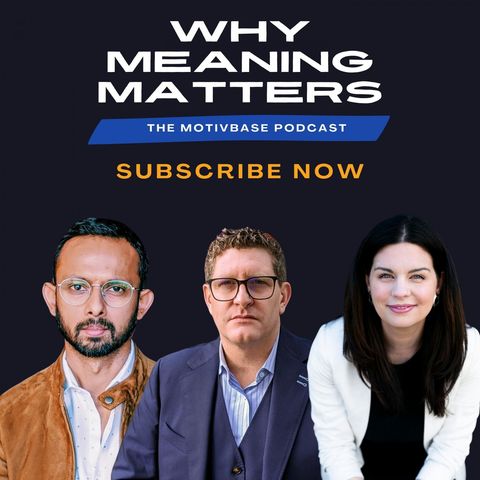27 JAN 2022 · In this episode of Why Meaning Matters, we shift our conversation from the exterior of home and fashion to the interior of the human body as Erin, Jason and Ujwal explore the changing meaning and consumer understanding of infectious disease. Infection and disease has been seen by North Americans as an ‘other’ problem. But, triggered by a global pandemic striking close to home, that cultural meaning is changing by leaps and bounds. Listen in as we discuss consumer awareness of immune health and the inequities associated with it. Welcome to Why Meaning Matters. A Story Studio Network podcast hosted by Erin Trafford with MotivBase cultural anthropologist, Ujwal Arkalgud and MotivBase president, Jason Partridge. While the knowledge of immune health has grown over the last few years, consumers are still very confused on how to improve and manage their own immune health. UJWAL [00:03:31] “People realize suddenly, hang on a second, sleep has a role. Food has a role. My stress levels has a role. So this is truly a holistic approach to immune health, which a lot of us have would have imagined, would have happened sooner. But in many ways, the pandemic has finally brought this culture to bear.” A topic or idea like immune health only has as big an impact as the things people are associating with it. JASON [00:06:20] “It is literally expanded in culture to become more dominant and that's why it's really kind of driving a lot of changes all the way down from kind of how we're thinking about how we live our lives, but also in the choices that we're making and, you know, kind of how we're, we're actually behaving on a day to day basis.” For the first time, the problem of inequity is being highlighted and noticed by the middle and upper middle class consumers in the context of immune health. UJWAL [00:07:23] “If you look at sleep itself, it’s such a privilege in America, right? Because if you look at somebody, let's take a single mother, who's in a lower income household. She's probably working shift jobs and holding three jobs together, barely has time to take care of her kids, can't sleep. How can she improve her immune health?” JASON [00:9:04] “The nation was faced with an existential nightmare and they had to contemplate mortality and they had to think about the role of community and they had to think about, ‘How can we basically make choices that will protect others, which will inherently protect me?’” So, what does it all mean for consumers and retailers who are thinking about community immune health? JASON [00:12:48] “Changes and shifts in the idea of what an infectious disease means is going to change how we buy things.” It also changes policy. UJWAL [00:13:05] “For example, if you hire shift workers, what are small changes you can make to reduce their stress levels, to give them better sleep, to give them better access to health initiatives, to mental health and mental wellness practices?” Next week on Why Meaning Matters, we continue our conversation on health and look at the changing meaning of healthy skin and skin care. Why Meaning Matters is a podcast produced by Story Studio Network and iContact Productions for MotivBase- Decoding implicit meaning behind what people talk about. If you want to contribute to the conversation, make sure you drop us an email at hello [at] storystudionetwork [dot] com. If you enjoyed this episode, be sure to SHARE it, RATE it, and SUBSCRIBE to the show!


